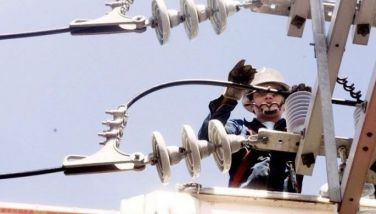Banning idling

In our last column, we gave way to one of our readers, Richard Foster, who has been campaigning for years against motor engine idling. He has had modest success in having the Cebu Business Park impose a total ban on idling, and he is pushing for a Cebu-wide adoption of the same.
Going through materials about idling, I can see why Foster relentlessly pursues this advocacy. When a vehicle’s engine is kept running while parked or even at a lengthy period of time in traffic, the fumes that build up are particularly hazardous to people’s health.
Even with governments’ push for cleaner fuels, exhaust from gasoline- and diesel-run vehicles still contains pollutants that have been linked to many respiratory diseases, heart problems, cancer, and many other health concerns. Idling also increases the amount of dirty exhausts in the air that we breathe.
Children have been found to be most susceptible to engine exhausts, their lungs being more sensitive and still developing. Asthma cases are higher among children because they breathe 50 percent more of pollutants than adults do.
The problems relating air pollution in the environment to vehicle exhaust have been meticulously documented, from ground level ozone or smog, to acid rain, climate change, and many more environmental problems. Once again, engine idling produces only more exhaust, exacerbating air pollution further.
Finally, idling is bad for your wallet, especially now that diesel prices have more than doubled from before the Russian army invaded Ukraine. Idling burns fuel while you sit still inside your vehicle. Depending on your motor displacement, idling burns an average of about two liters of fuel per hour.
Bad habits
Engine idling is more a driver’s bad habit. Especially in the Philippines where the weather is tropical, car owners would rather sit and wait inside a vehicle with the engine turned on and the air-conditioning in full blast.
Instead of stepping out of the vehicle to wait for passengers, many drivers of public utility vans keep their engine and aircon running until ready to leave the terminal. Those inside the vehicle may suffer less from the smoke being belched out, but others outside waiting for their rides are exposed to the deadly fumes.
Jeepneys that don’t have air-conditioning are worse. Their drivers habitually stop by the road near intersections to wait for more passengers, exposing not only their passengers, but also other people who are standing or walking near them. Since most jeepneys are not well maintained, idling wastes more fuel.
School parking areas are also notorious for vehicles that keep their engine running while waiting for students to board. School administrators should be more cognizant of the hazards posed to their students, as well as to other people waiting to pick up their wards.
The worst of idling is in an underground car park, where the building’s exhaust fans are often not able to quickly disperse the fumes that running engines of parked vehicles emit. Lucky for commuters who can hop off their vehicles straight into the main building, but not so for those who have to walk from their cars from wherever they are parked.
As our reader points out in a letter sent to another paper, there are too many of these neglectful drivers: from those of BPO shuttle vans, armored vehicles, delivery vans, taxis, trucks, and government, as well as private vehicles.
Regulations and enforcement
Local government should seriously look at totally eradicating idling, especially outside schools and churches, within mall premises, public parking areas, in underground basements, and even multi-level high-rise parking buildings, even if these are well-aired.
Cities and municipalities can easily pass regulations that will make idling in parking and public spaces punishable, but such laws must be accompanied by stronger enforcement mechanisms. We can borrow from the experience of New York City whose anti-idling law had been in existence since the 1970s, but only just a few years ago found the right formula to create an environment where idling vehicles were fined.
While NYC’s new initiatives are still not foolproof, especially since the target of idling violations are only mostly trucks and buses, drivers became more aware of the penalties they face should they be caught keeping their engines running for longer periods.
NYC’s “idle” activists or those against vehicle idling are still brainstorming on an equally effective law that will penalize errant private vehicles, which according to city stats, account for half of idling instances.
The local anti-idling law was given more teeth in 2018 after New York adopted a Citizens Air Complaint Program where citizens can report idling instances and evidence with the city’s Department of Environment Protection. If the accused vehicle driver is found guilty, part of the fine goes to the citizen activist.
Tips
You yourself should instill an awareness of the ill effects of idling. Self-discipline to do what is right follows next. Here are some tips to wean yourself from the practice:
- If you expect to wait for more than 30 seconds, turn off your engine (except when in traffic or at stoplights).
- Avoid drive-through windows. Instead, park and go inside. If you need to go drive-through, turn off your engine when at the window while giving orders.
- When waiting to pick up a child from school or a kin from church, park, turn off your engine, leave and lock up the vehicle, and wait in a shaded area.
Getting off the idling temptation not only saves precious pesos, but also the health of other people and the environment.
Facebook and Twitter
We are actively using two social networking websites to reach out more often and even interact with and engage our readers, friends and colleagues in the various areas of interest that I tackle in my column. Please like us on www.facebook.com/ReyGamboa and follow us on www.twitter.com/ReyGamboa.
Should you wish to share any insights, write me at Link Edge, 25th Floor, 139 Corporate Center, Valero Street, Salcedo Village, 1227 Makati City. Or e-mail me at [email protected]. For a compilation of previous articles, visit www.BizlinksPhilippines.net.
- Latest
- Trending






























